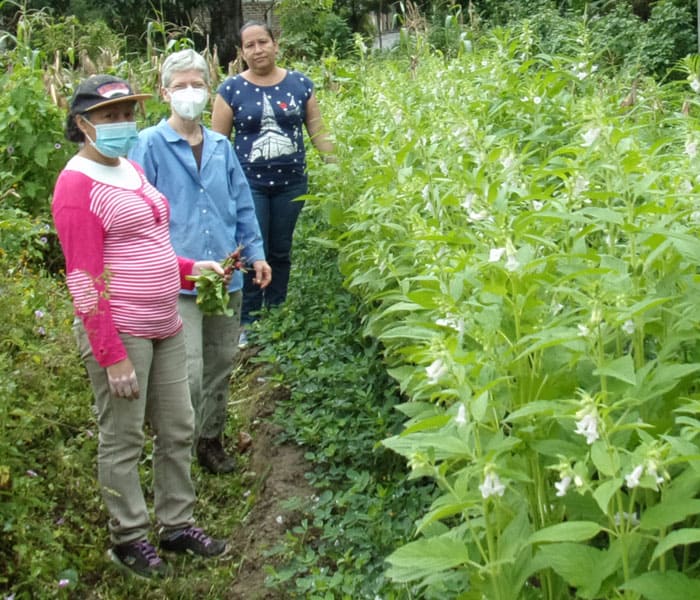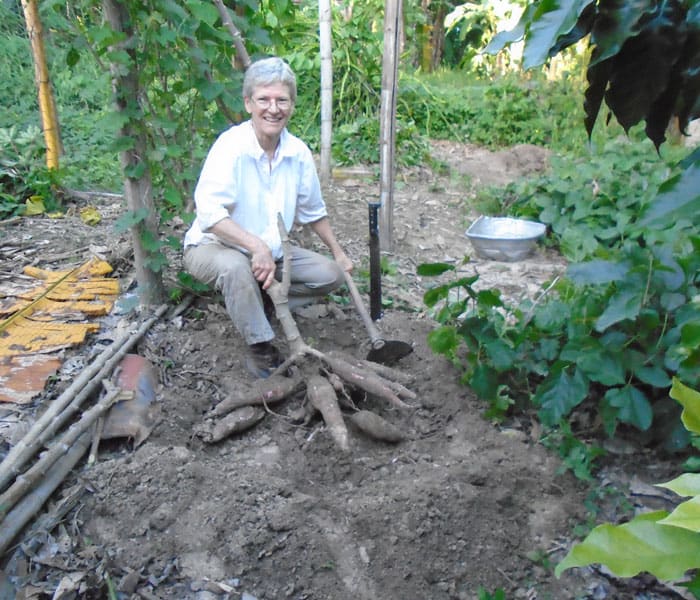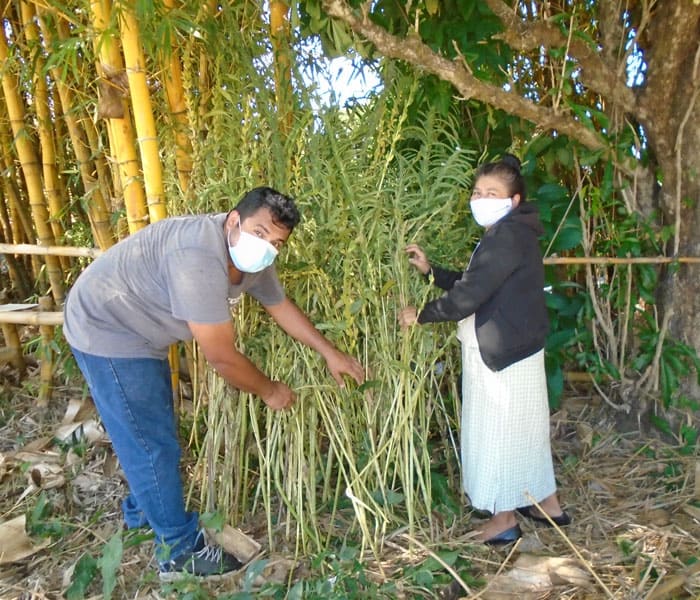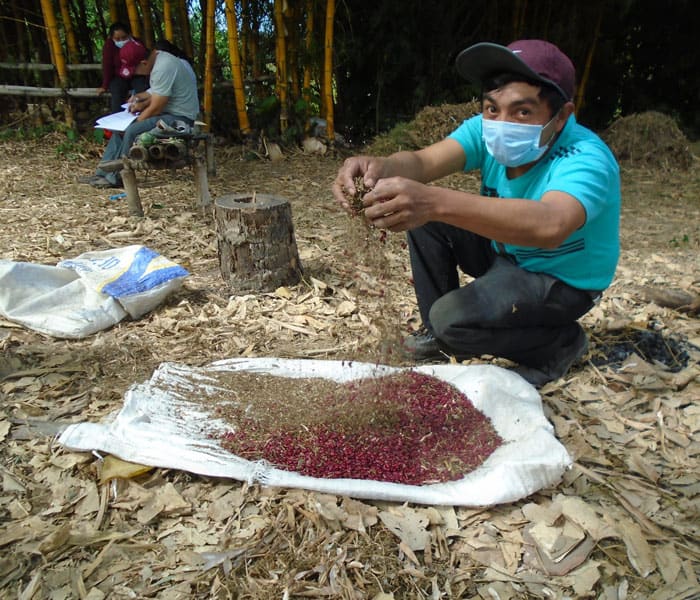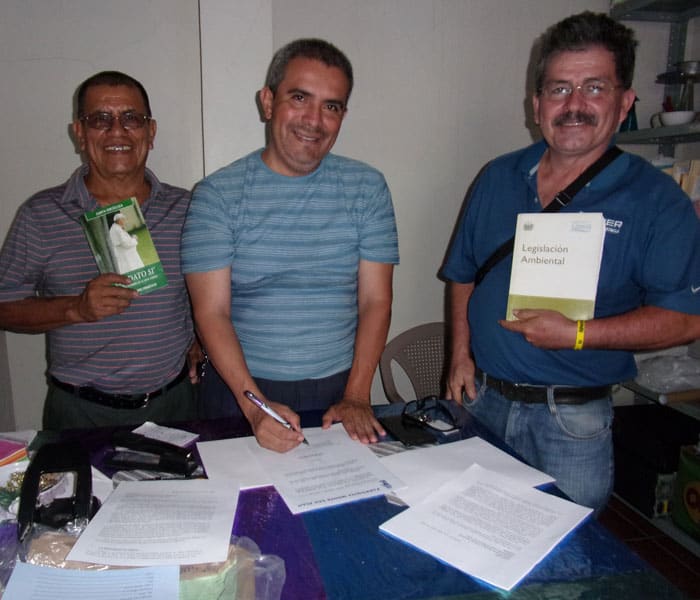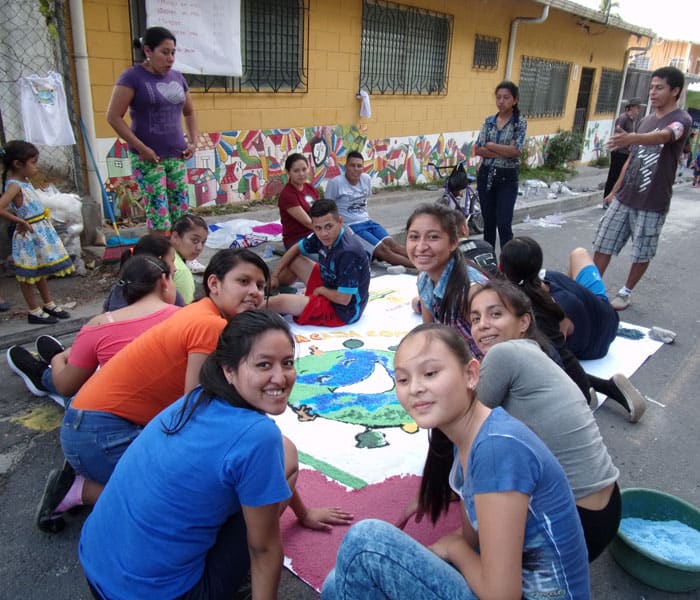Maryknoll lay missioner in El Salvador promotes sustainable agriculture and environmental awareness.
Every year, Pope Francis asks us to observe the Season of Creation from September 1, the World Day of Prayer for the Care of Creation, to October 4, the Feast of St. Francis of Assisi. This year’s theme is “Listen to the Voice of Creation.”
In the rural parish of Monte San Juan in the department (state) of Cuscatlán, El Salvador where I serve as a Maryknoll lay missioner, we try to do just that.
Monte San Juan’s mountainous terrain is not highly productive, yet farmers here aim to produce enough corn and beans for their families’ sustenance. Our parish-based agricultural program improves food security through crop diversification and sustainable organic production.
“My family has seen the benefits of reducing chemicals on our farm,” says Francisca Ventura, who has been involved in the program since it began in 2013. “It is more work to weed by hand rather than spray herbicides,” she explains, “but we are convinced it’s healthier for us and for the environment.” In addition to turning part of her yard into a vegetable garden, Francisca planted fruit trees, improved her poultry practices and started raising pigs and tilapia fish. This provides greater food security for her family and produces extra income.
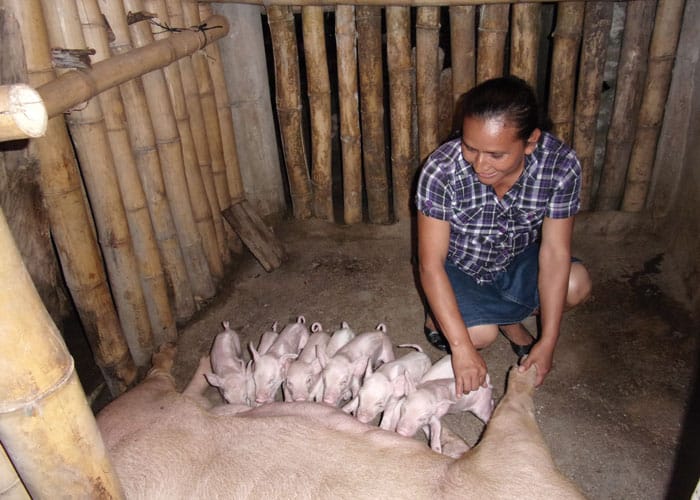
Monte San Juan agricultural program member Francisca Ventura tends to a litter of piglets. The program helped her to diversify her family farm. (Courtesy Margaret Vámosy/El Salvador)
Francisca and other program members also explore practices to mitigate the effects of climate change. That means implementing soil and water conservation techniques for greater resilience under changing rainfall patterns; saving seeds from resistant plants to improve future crops’ ability to withstand storms, drought and pests; and avoiding agrochemicals that can be deleterious to pollinators and other beneficial insects (as well as to microorganisms in the soil).
A program member offered a piece of land to try out these practices. This has enabled us to experiment — to succeed and to fail — and, especially, to learn together.
In mission, I accompany our sisters and brothers in discovering how to identify problems and needs; how to test solutions and evaluate results. I don’t have all the answers! And, neither I nor any other technical advisor will always be around as new problems arise.
Empowerment is part of a faith journey. When we realize our dignity as children of God, we become motivated to live in a more dignified manner, making decisions for ourselves, eating better and providing a sustainable future for our children.
My own journey started on a family farm in New York State. Called to combat world hunger, I pursued an education at Cornell and Texas A&M universities and worked in Ecuador and Honduras and on a Native American reservation in Arizona. Joining the Maryknoll Lay Missioners, I served in East Timor and Cambodia before arriving to El Salvador in 2012. Even at my age, 64, I learn something new every day. I’ve diversified my organic garden by adding things like tree spinach, air potatoes and turmeric!
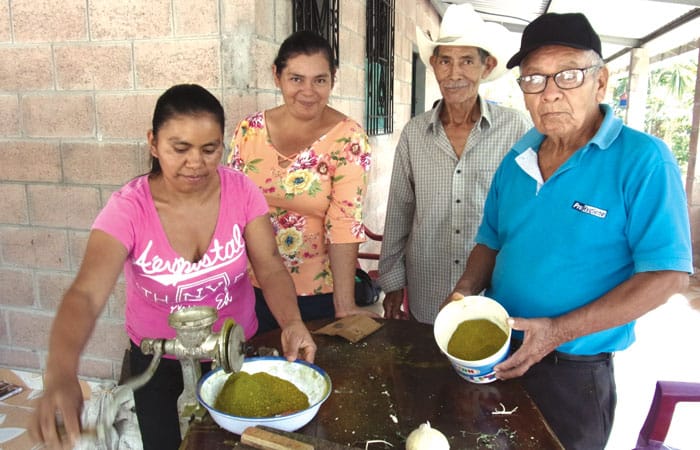
Monte San Juan agricultural program members (left to right) Dorita, Ruvidia, Antonio and Cándido grind herbs for turmeric seasoning. (Courtesy Margaret Vámosy/El Salvador)
Along with the agricultural program, I work with our parish environmental committee. One of our first projects was to set up collection bins for recyclable bottles and cans at the two main churches and all chapels in the parish’s 12 communities. We promote the three R’s: “Reduce, Reuse, Recycle.”
The committee has made progress toward reducing the use of disposable plates and cups at parish events. In El Salvador, the cheapest disposable material is Styrofoam — which by all accounts will never biodegrade. With the support of our pastor, Father Mauricio Saravia, our committee convinced the parish and most village chapel communities to acquire reusable plastic cups and plates for gatherings. Hygiene is not insurmountable, but overcoming the appetite for convenience often seems to be.
We spent a year reading and explaining in short sessions, piece by piece, Pope Francis’ encyclical Laudato Si’ before Sunday Mass. And we continue to hold training sessions on the importance of caring for our common home.
One day in 2018, while riding the bus to town, committee member Domingo Chávez and I noted a “Land for Sale” sign — precisely at the headwaters of the San Juan River. For years, our committee had been concerned about its diminishing flow and increasing pollution. “Just imagine what will happen to the river if developers are allowed to build houses or businesses here!” Domingo said, knowing its importance to the local people as a source of irrigation and as a cool and refreshing place to relax.
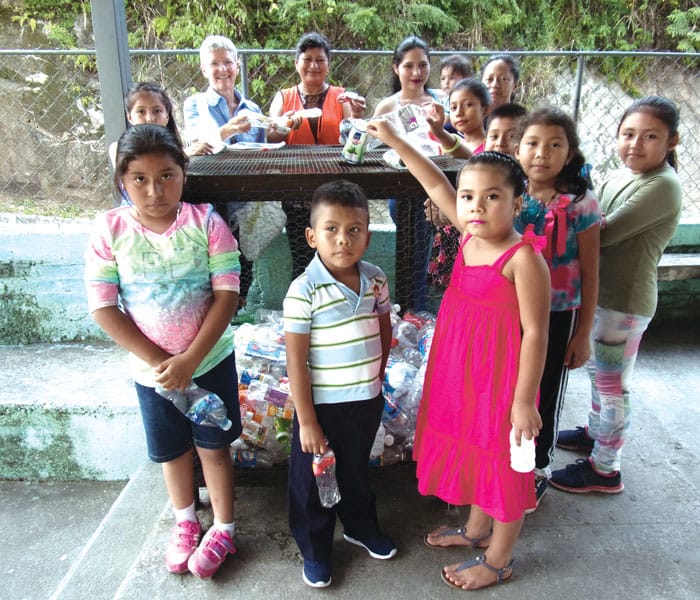
Maryknoll Lay Missioner Margaret (Peg) Vámosy and adult community leaders teach children of the village of San Nicolás to recycle. (Courtesy Margaret Vámosy/El Salvador)
Due to lack of funds, purchase of the land by the town was out of the question. Enlisting the aid of the national Ministry of the Environment and Natural Resources, we learned that our best alternative was to create a management plan for the watershed.
We started working with farmers, town leaders and national and local government personnel. Volunteers are learning to measure the quality and quantity of flow in the river so they can monitor those factors regularly. Government officials were impressed the initiative came from within the community and invested in a case study of the work, something we hope will encourage other parish or community groups to take action in their own areas.
Click on the arrows to see the slideshow photos:
Scenes from Monte San Juan parish’s agricultural program and environmental committee (Courtesy Margaret Vámosy/El Salvador)
1-Peg Vámosy (center), Francisca Marroquín and Reina López survey a planting of organic peanuts and sesame
2-Peg Vámosy digs cassava
3-Luís and Nohemí place sesame plants upright to dry
4-Omar winnows red beans in the program’s field
5-Domingo Chávez (left) and Reinaldo Quezada (right) hold up copies of Laudato Si’ and environmental law code in 2018 as the now late pastor, Father Mauricio Saravia, signs a letter to the local mayor
6-for Good Friday, a parish youth group creates an environment-themed street mural made of colored salt
As a collaboration between four municipal governments, national institutions and local actors, the watershed management plan will only succeed if people join forces and work together. If people realize they can work together on a river project, they can work together on any number of other issues. Beyond saving a river, ours is also an attempt to empower people and help them take charge, truly planning for a sustainable future.
Cándido Fernández, who participates in the agricultural program and environmental committee, says he hopes the watershed plan will make it possible for young people to stay on the farms. He asks, “If no one wants to work in the fields to grow the food, what will the generations of tomorrow eat?”
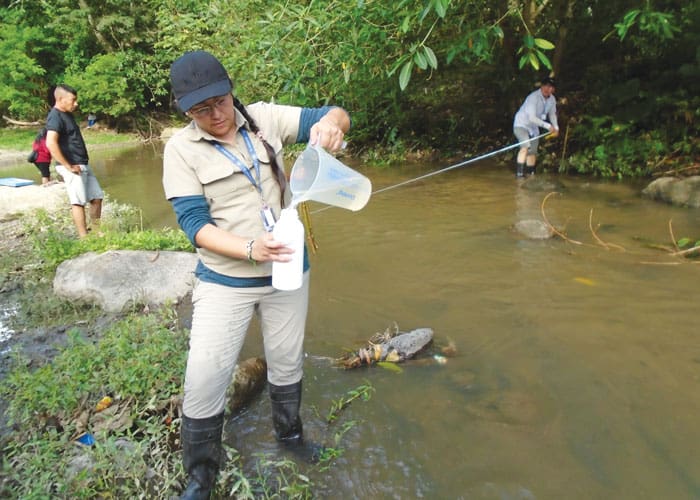
A technician from the national Ministry of the Environment and Natural Resources, Sol Muñoz, collects a river water sample while others take stream flow measurements. (Courtesy Margaret Vámosy)
By listening to the voices of farm families and community members, we learn from each other. Listening also to the land and the river, we grow in respect for all voices of creation — blended into a chorus that sings of the glory of God. As Pope Francis wrote, “In union with all creatures, we journey through this land seeking God … Let us sing as we go. May our struggles and our concern for this planet never take away the joy of our hope.” (Laudato Si’ no. 244)
Featured Image: Maryknoll Lay Missioner Margaret Vámosy (center) and agricultural program members Cándido Fernández and Margarita Hernández harvest organic corn in Monte San Juan, El Salvador. (Courtesy Margaret Vámosy/El Salvador)
![]()
